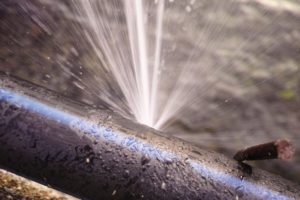
We’ve all heard horror stories about (or experienced first-hand) pipes bursting during the winter, thanks to the cold, frigid temperatures in the GTA. But just because it’s summertime right now doesn’t mean you’re in the clear. Pipe bursts in the summer can occur for a number of reasons, which is why it’s important to be proactive. Here’s what you need to know about what causes pipe bursts in the summer and how to prevent them from happening.
Causes of Burst Pipes in the Summer
Extreme Heat
What temperature do pipes burst at? Extreme temperatures, whether hot or cold, increase the risk of your pipes bursting. A lack of rain to cool down the ground and severe heat during the summer can dry out the land causing the soil to become looser. As this happens, pipes have more room to shift inside the ground as they expand from the extreme heat. If your pipes are older, they have a higher propensity of breaking as they shift around more than usual. Although this is unlikely to happen inside your home where the temperature is controlled, they can burst on their route from outside of your home to inside. A helpful tip for preventing burst pipes during the summer is to cut back on how much water you use or use lower pressure when turning on the taps to relieve the stress on your system.
Older Pipes
Cold or heat may not be affecting your pipes, but if they’re old, rusty, and impacted by too much wear and tear, they will be vulnerable to bursting. You should have your pipes inspected each year to ensure they can withstand the water pressure.
Hard Water Weakens Pipes
Did you know that the type of water that flows through your pipes can affect its integrity? Hard water has more magnesium and calcium than soft water. Both minerals can be harmful to the body and detrimental to your home’s pipes. When these minerals build up in the pipes and faucets, it can slow down your water pressure. Overtime, the buildup can corrode through your pipelines, creating holes in the water flow.
Incorrectly Installed Pipes
Home inspections are extremely important when looking to buy a new home. Without this, you could risk buying a home with incorrectly installed pipes. These increase the risk of pipe leaks, especially when there is a poorly soldered or fitted connection between the pipes.
Clogged Pipes
Perhaps one of the most obvious causes of burst pipes are clogs. If you pour cooking grease down your pipes, clog your toilet, or have laundry lint buildup, the accumulated debris can restrict the flow of water through the sewage lines and create pipe bursts. Although water softeners improve the quality of water in your home, these systems can also create plumbing problems if not inspected regularly. One of the first signs of clogs forming in your pipes is low water pressure.
Invasive Roots
The deep roots of trees around your home are naturally drawn to pinhole leaks in outdoor pipes. As time goes on and as the tree grows, the roots exert intense pressure on plumbing. They love wrapping around sewage lines, which can lead to broken pipes in the bathroom.
Faulty Repairs
It can be challenging to tell whether a soldering job will hold up and stand the test of time. Faulty repairs and patches can actually do more harm than good, which is why you should seek professional assistance to repair any burst or damaged pipes. Badly repaired pipes can rupture in the heat of summer and cost you more to fix than the original patch up.
How to Avoid Burst Pipes in the Summer
Perform a Checkup Often
The best way to avoid burst pipes in the summer is to check them on a timely basis. If you cannot do annual inspections, do them every other year. The more often you have them inspected, the less likely they will be at risk of bursting and flooding your home.
Cut off Water Supply When Travelling
When homes flood in the summer, it often occurs when homeowners have gone away for a vacation. During this time the pipes are left unattended and tiny leaks go unnoticed for too long. When the weather is extremely hot, it can cause the pipes to burst. Have a friend or relative stop by every few days to do a quick check of your home and make sure everything is okay or even better, shut off the water supply when travelling.
Insulating Pipes for Summer and Harsh Weather
Insulating tape or wraps can protect your pipes during the summer and winter from the harsh weather. During the winter, pipes can burst at freezing temperature of zero degrees Celsius or 32 degrees Fahrenheit. You may be able to do this yourself, but a professional flood prevention specialist can help you do it correctly.
Water Damage Restoration by Flood Services Canada
There are a variety of steps you can take to protect your plumbing during the hot summer months and these tips are a good place to start. If you need quick water damage restoration, Flood Services Canada can help you. Our professionals offer a variety of services and solutions to problems related to water damage. We deploy our quick-response teams to cities across the Greater Toronto Area to help homeowners save their home in emergency situations.
Our services include 24/7 sewage, water damage, and flood cleanup services and we will use the best techniques, personnel, and equipment to ensure your home is clean, safe, and dry as soon as possible. Contact us at (416) 302-2107 to learn more about our services or use our emergency hotline at (416) 999-3930 to get our rapid-response teams deployed to your location.
